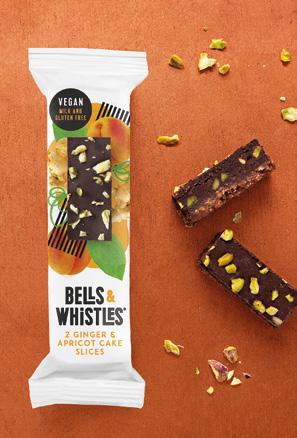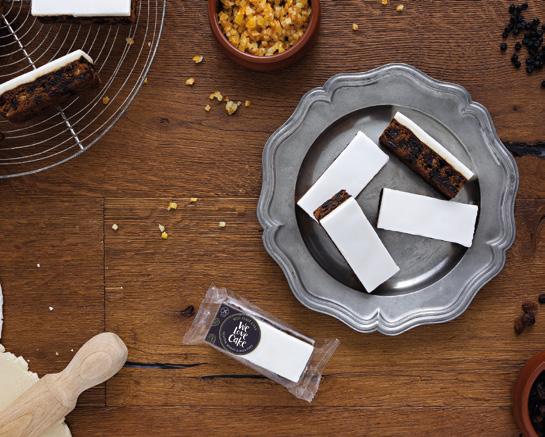
6 minute read
The Bakery Balancing Act
As consumer trends steer towards healthier options - as well as greater convenience and a focus on ethical choices - how can the bakery sector use frozen to meet these expectations without compromising on product appeal? Emma Scott looks at the evidence.
Think bakery and what springs to mind? Freshly-baked bread, tempting cakes, pies, puddings, pastries. A picture of indulgence, but perhaps not the go-to section for an increasingly health-conscious consumer, which presents a problem to those in the business of baking.
Information, data and measurement firm Nielsen found this year that 39% of shoppers are actively seeking snacks with less sugar and veganism shows no signs of slowing down, with 16% of all product launches now carrying a vegan label (Mintel, 2019). Meanwhile Public Health England 2020 sugar targets are looming.
Baked goods free from sugar, gluten and dairy are still far from the norm but the sector is embracing innovative new product development to respond to this growing market.
Emily Sudell, We Love Cake brand manager for Bells of Lazonby, says: “Brands are not only seeing this growth in demand as an opportunity to innovate and build new products, but rather an essential if they wish to maintain the status and popularity of their current lines within the market.”
This is why the company took the decision to reformulate the sugar content of its We Love Cake range to future-proof it for the 2020 sugar targets. Launched in spring 2019, the company has since seen growth of 28% YOY due to the recipe reformulation.
customer demand for these types of products is really pulling through.”

That said, it’s vital for the sector to avoid losing sight of its own unique and unequivocal appeal – indulgence and flavour.
When Jennifer LaPaugh - senior director, regional and artisanal channel marketing at Dawn Foods - spoke at the International Baking Industry Exposition in Las Vegas this year, she outlined several key emerging consumer trends.
While one of these does reflect the demand for healthier baked goods, which she calls ‘enlightened eating’, at the opposite end of the spectrum is ‘blissful indulgence’, which describes how people are looking for “opportunities to disconnect and reduce stress and anxiety through personalised, highly indulgent sweet goods or desserts that provide a momentary escape from reality”.
Quite the experience.
This trend, she argues, is being fuelled by an uncertain political climate that’s affecting consumers directly.
So the idea of baked goods being a treat is still important but in a sector in which gluten, dairy and eggs have traditionally been the main components of recipes, maintaining the feel-good factor requires some creative thinking.
So what flavour trends can the bakery and convenience sectors capitalise on to keep customers coming back?
Emily Sudell suggests bakery hybrids will continue to crop up, with many taking influence from across the pond: “Merging mainstream flavours and national favourites is a great way to offer something different that will still deliver on sales. We Love Cake has done a mash of a brownie and cookie as its showstopper NPD piece this year. The ‘Brookie’ has a soft-baked chocolate chip cookie base and is topped with a marbled blend of moist chocolate brownie and cookie.”

Kate Sykes, marketing manager of Lantmännen Unibake UK, agrees that taking inspiration from across the globe is key to creating exciting new offerings.

It seems clear the bakery sector must perform a tricky balancing act; creating healthy yet decadent products that offer maximum indulgence with minimum guilt.
She said: “There’s an insatiable appetite for world flavours and this year we’ve seen the growing popularity of Scandinavian Soft Doughs and the huge success of the Portuguese Custard Tart – sales have increased a staggering 458% since 2016. Middle-Eastern tastes are also proving popular, straddling both savoury and sweet bakery.” However, she warns against replacing tried and tested favourites with more exotic options: “There is plenty of scope for expansion in both sweet and savoury bakery but core ranges remain fundamental to sales success. In the same way most retailers wouldn’t consider leaving a number one brand like Coca-Cola out of their drinks range, retailers should ensure they stock the UK’s best sellers in both Danish and French pastry.” She explains the top three selling Danish Pastry SKUs deliver 62% of total category value sales. The Schulstad Bakery Solutions Maple Pecan Plait, Cinnamon Swirl and Vanilla Creme Crown are the topsellers in the Danish pastry range and must-stock French pastries include the All Butter Croissant, Pain au Chocolat and Pain aux Raisins. The We Love Cake team think they’ve cracked it with their festive offering for 2019.
Included in the range is a gluten, wheat and milk free Vegan Mince Pie, as well as a Chocolate and Orange Tart. Emily Sudell says both have freefrom credentials without compromising on taste. In fact, a national garden centre chain has taken the decision to serve these two products as their luxury offering on the menu for all customers to enjoy, because the flavour is superior to that of their conventional gluten-containing offering, she reveals. So with some creative thinking and the expertise of a creative NPD chef who doesn’t shy away from innovation, it is possible to create healthier versions of the nation’s favourite baked goods. But there is another box to tick on the list of consumer demands: ethical purchasing.



According to the Ethical Consumer Markets report 2018, young people in particular are turning to more sustainable options. Indeed, almost half (49%) of under-24s were found to have avoided a product or service due to its negative environmental impact.
Naturally, figures like this are leading brands to take a fresh look at their packaging materials but the bakery sector can score an easy environmental win by supplying frozen products.
Emily Sudell observes caterers across the food service sector are waking up to the strength of frozen in reducing wastage from a bottom-line point of view as well as a food sustainability standpoint.
“As caterers are being put under the spotlight, in terms of reporting their food wastage more transparently, there’s pressure for them to find products that deliver on flavour but not at the expense of short shelf-life products,” she explains.
“Frozen offers a great solution whereby caterers can defrost bakery products based on their footfall and anticipated throughput for the day, meaning their close-of-play throw away is significantly minimised,” she adds.
Minimised wastage is just one of the benefits frozen can offer the bakery sector. Baked goods can be batch produced, hand finished and given that home-baked feel then supplied to caterers in a frozen format. Once defrosted or oven-baked the consumer can still enjoy the fresh-baked taste and aroma that will, ultimately, keep them coming back for more.
Brands across the sector are rising to the challenge of meeting consumer demand for healthier, free-from and vegan products without compromising on flavour or negatively impacting the environment. Those who embrace frozen will find it easier to meet this increasingly strict consumer criteria.
Freezing baked products provides the flexibility to be innovative with new flavours without being constrained by limited shelf life. It’s also known to minimise food waste. But most importantly, freezing enables manufacturers to preserve baked goods at peak quality, so no matter what re-formulation the recipe undergoes consumers can still enjoy the ‘fresh’ baked taste they love.

"The bakery sector must perform a tricky balancing act; creating healthy yet decadent products that offer maximum indulgence with minimum guilt."


